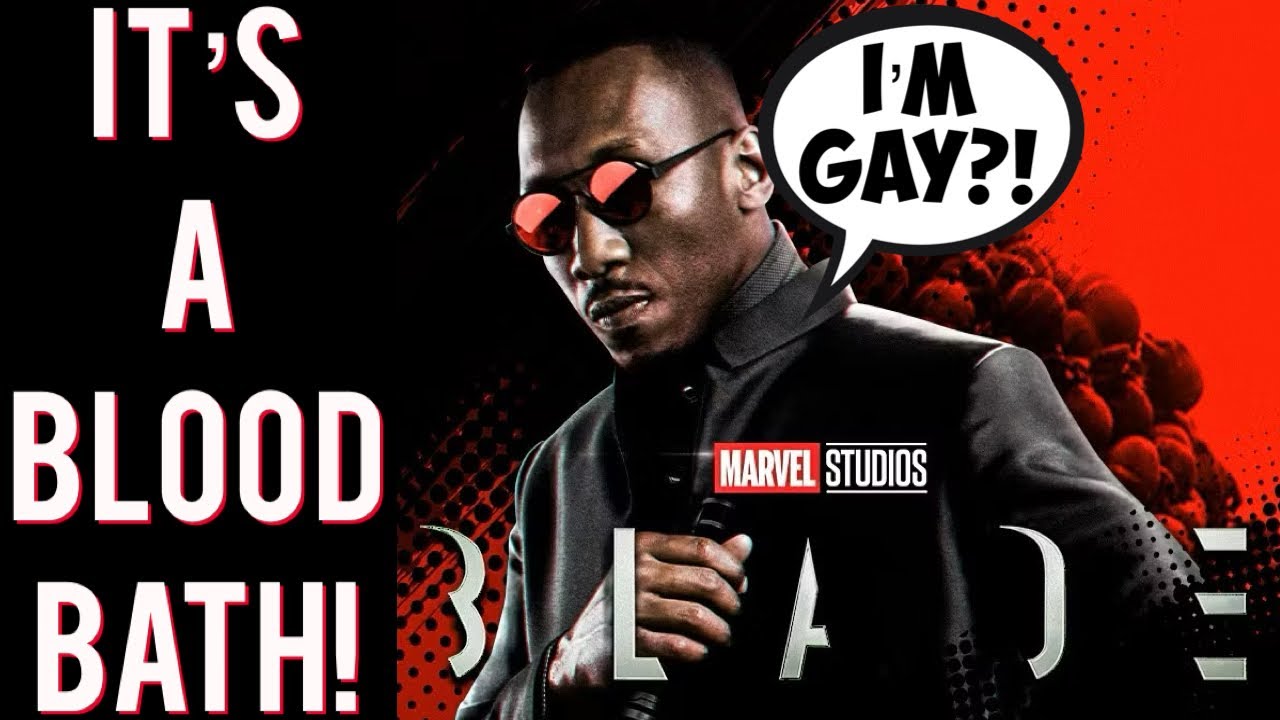The Marvel Cinematic Universe (MCU) has faced its share of challenges, but none have been as publicly tumultuous as the long-gestating Blade reboot starring Mahershala Ali. Announced with fanfare at San Diego Comic-Con in 2019, the project promised to bring the iconic vampire hunter into the MCU with a fresh vision. However, in April 2025, insider reports confirmed what many feared: the Blade reboot has been cancelled, with sources describing its production as a “sh*t show” marred by creative disputes, revolving door of talent, and external setbacks. This collapse comes despite the critical and commercial success of Sinners, a vampire-themed film by Ryan Coogler, which some speculate borrowed elements from Blade’s abandoned script. The cancellation has sparked outrage among fans, raised questions about Marvel’s supernatural ambitions, and left Ali’s future as the Daywalker in limbo. This 1500-word article explores the chaotic journey of Blade’s demise, the factors behind its failure, and what it means for the MCU’s future.

The Rise and Fall of Blade: A Troubled Timeline
The Blade reboot was unveiled with high expectations, driven by Ali’s star power and the legacy of Wesley Snipes’ 1998-2004 trilogy, which pioneered modern superhero cinema. Ali, fresh off an Oscar win for Green Book, pitched himself to Marvel Studios president Kevin Feige, securing the role of Eric Brooks, the half-human, half-vampire vampire slayer. The project was slated for a November 2023 release, with a vision to integrate Blade into the MCU’s burgeoning supernatural corner, alongside Moon Knight, Werewolf by Night, and Doctor Strange. Mia Goth was cast as the villain Lilith, and Delroy Lindo and Aaron Pierre joined in supporting roles, fueling excitement for a gritty, R-rated take on the character.
However, the production quickly unraveled. By 2022, director Bassam Tariq (Mogul Mowgli) exited due to creative differences, followed by writer Stacy Osei-Kuffour. Yann Demange (Lovecraft Country) took over, with Michael Starrbury penning a new script, but Demange also departed in June 2024, citing scheduling conflicts. The script saw at least six writers, including Black Widow’s Eric Pearson, with reports of one draft relegating Blade to a “fourth lead” in his own film, prompting Ali’s frustration. The 2023 WGA and SAG-AFTRA strikes further delayed progress, and by October 2024, Disney removed Blade from its November 7, 2025, release slot, replacing it with Predator: Badlands. Insiders now confirm the project is “nixed” for the foreseeable future, with no active production timeline.
Insiders’ Verdict: A “Sh*t Show” Production
The term “sh*t show” emerged from insider accounts on platforms like X, where posts described a production plagued by indecision and dysfunction. Delroy Lindo, who left the project in 2024, told Entertainment Weekly that Blade “just went off the rails,” despite early excitement for his role as a Marcus Garvey-inspired community leader. He cited creative differences and a lack of cohesive vision, echoing sentiments from costume designer Ruth E. Carter, who revealed the film was set in the 1920s before stalling during the 2023 strikes. Carter, now working on Sinners, noted the overlap in researching vampire period pieces, hinting that Sinners may have absorbed Blade’s ideas.
Reports suggest Marvel struggled to define Blade’s tone and scope. Early scripts oscillated between a 1920s origin story and a multigenerational epic, with some drafts criticized for sidelining Ali’s character in favor of female leads or life-lesson themes. Budget constraints, reportedly capped at $100 million, clashed with Ali’s vision for a high-stakes actioner, leading to tensions with Marvel. The departure of key cast members like Lindo and Pierre, coupled with rumors of Ali nearly quitting over script quality, painted a picture of a project in disarray. One X post speculated that Sinners, a 1930s vampire thriller starring Michael B. Jordan, was an “altered version” of a Blade pitch rejected by Marvel, a claim bolstered by Carter’s comments about shared research.
Sinners’ Success: A Bitter Irony
The cancellation of Blade is particularly stinging given the success of Sinners, directed by Ryan Coogler and released in March 2025. The film, set in 1930s Mississippi, follows twin brothers (Jordan) battling supernatural forces, earning $80 million worldwide and a near-perfect Rotten Tomatoes score. Critics praised its blend of horror, action, and historical drama, with Lindo’s role as a community elder drawing comparisons to his abandoned Blade character. Fans on X have noted parallels, with one user lamenting, “Coogler pitched Sinners to Marvel as Blade, they said no, and now it’s a hit while Blade’s cancelled. Gotta laugh.” The irony is compounded by Sinners’ critical acclaim as a vampire story, a genre Blade was meant to dominate in the MCU.
Sinners’ success highlights what Blade could have been: a bold, culturally resonant take on the vampire mythos. While Blade languished, Coogler’s team delivered a cohesive vision, leveraging period aesthetics and a strong ensemble. The contrast has fueled speculation that Marvel’s rejection of a similar pitch for Blade—potentially due to budget or tonal concerns—was a critical misstep. Michael B. Jordan, a Sinners star, expressed hope to GQ in February 2025 that Blade would “get things straightened out,” but the cancellation has dashed those expectations, leaving fans to wonder if Marvel missed a golden opportunity.
Fan Outrage and the Snipes Factor
The cancellation has unleashed a torrent of fan frustration on X, with posts like “Marvel handled Blade so badly they admitted defeat in Deadpool & Wolverine” reflecting the depth of disappointment. The 1998 Blade, starring Wesley Snipes, was a trailblazer, grossing $131 million and paving the way for the superhero boom. Its gritty, R-rated style and Snipes’ charismatic performance made it a cultural touchstone, raising expectations for Ali’s reboot. However, the project’s collapse has led some to argue that Marvel squandered a chance to honor that legacy.
Snipes’ cameo in Deadpool & Wolverine (2024), where he quipped, “There’s only one Blade, and there’s only ever gonna be one Blade,” was a meta jab at the reboot’s struggles, earning roars from audiences. His well-received return has sparked calls for Snipes to reclaim the role, with fans on X arguing, “Why reboot when Wesley Snipes still has it?” The cameo, coupled with the reboot’s cancellation, has fueled theories that Marvel might pivot to a multiverse workaround, integrating Snipes’ Blade into projects like Avengers: Secret Wars. However, Kevin Feige has reiterated Ali’s centrality, stating in 2024, “We love Mahershala’s version of him,” though insiders suggest Ali may now appear in a supporting role in Midnight Sons or Avengers: Doomsday.
Why Blade Fell Apart: A Perfect Storm
Several factors contributed to Blade’s demise. First, Marvel’s indecision on tone—whether to pursue a horror-driven, R-rated film or a more accessible PG-13 actioner—led to conflicting scripts. The 1920s setting, while ambitious, clashed with the MCU’s modern timeline, complicating integration with characters like Moon Knight or Doctor Strange. Second, budget constraints limited the scope, with reports of a $100 million cap frustrating Ali’s vision for a blockbuster. Third, the revolving door of talent—two directors, six writers, and departing cast members—eroded momentum. The 2023 strikes and the COVID-19 pandemic further disrupted progress, but insiders argue the core issue was a lack of a “singular defining vision,” as one X post put it.
Marvel’s broader struggles also played a role. The MCU’s post-Endgame era has been criticized for “superhero fatigue,” with flops like The Marvels ($237 million loss) and mixed reception to Eternals. Blade’s supernatural focus, a relatively untested genre in the MCU, posed a risk, especially after Morbius’s failure ($167 million gross against $75 million budget). Feige’s 2024 pledge to limit Marvel to three films annually forced tough choices, and Blade—lacking a finished script or director—was an easy cut.
The MCU’s Supernatural Future: Blade’s Legacy
The cancellation leaves a void in the MCU’s supernatural roster. Blade was meant to anchor a darker corner of the universe, potentially leading to a Midnight Sons team-up with Moon Knight, Werewolf by Night, and Ghost Rider. Ali’s voice cameo in Eternals (2021), teasing a connection to Kit Harington’s Dane Whitman, hinted at this ambition, but subsequent projects like Moon Knight and Werewolf by Night excluded Blade, likely due to production delays. Fans on X have expressed dismay, with one writing, “No Blade means no Midnight Sons. Marvel’s dropping the ball on the supernatural side.”
Despite the cancellation, Ali remains attached, with insiders suggesting a debut in Midnight Sons or Avengers: Secret Wars. These projects could introduce Blade as a supporting player, much like Black Panther’s debut in Captain America: Civil War, setting the stage for a solo revival if he proves popular. However, the lack of a standalone film is a blow, as Blade was poised to be a cultural milestone—a Black-led, horror-infused superhero epic. The success of Sinners, with its $80 million gross and critical acclaim, underscores the demand for such stories, making Marvel’s failure to deliver Blade all the more glaring.
The Industry and Fan Response
The cancellation has dominated online discourse, with X posts reflecting a mix of anger and resignation. “Marvel REALLLLY dropped the ball,” one user wrote, while another called it “the biggest disappointment in Marvel movie history.” The sentiment is echoed by industry figures like Flying Lotus, who revealed to MCU_Direct that he was signed to compose Blade’s score before production paused, lamenting, “Maybe it’ll come around again, but I doubt it.” The collapse has also reignited debates about Marvel’s handling of legacy characters, with fans comparing Blade’s fate to the successful integration of Deadpool & Wolverine ($1.3 billion gross).
For Mahershala Ali, the cancellation is a setback but not a career-ender. His commitment to Blade—evident in his 2019 pitch to Feige—demonstrates his passion, and his acclaimed roles in Green Book and True Detective ensure he’ll remain a sought-after talent. Fans hope Ali will still embody Blade, with one X post stating, “Mahershala Ali deserves better. Give him a Midnight Sons role and make it right.” Meanwhile, Snipes’ Deadpool & Wolverine cameo has kept the character alive, prompting speculation about a multiverse crossover to bridge the old and new.
Looking Ahead: A Missed Opportunity
The cancellation of Blade is a cautionary tale for Marvel, highlighting the risks of indecision in an era of heightened fan expectations. The MCU’s upcoming slate—Captain America: Brave New World (February 2025), Thunderbolts (May 2025), and The Fantastic Four: First Steps (July 2025)—shows a focus on safer bets, but Blade’s absence leaves a gap in its supernatural ambitions. The success of Sinners proves audiences crave vampire stories, and Marvel’s failure to capitalize on this trend is a strategic misstep.
As Marvel prepares for Avengers: Doomsday (2026) and Avengers: Secret Wars (2027), the door remains open for Ali’s Blade to emerge, perhaps as a multiversal ally or Midnight Sons member. Yet, the loss of a standalone film stings, both for fans and for the MCU’s diversity goals. Blade could have been a landmark, blending horror, action, and cultural resonance, but its cancellation underscores the challenges of reviving a beloved franchise in a crowded superhero landscape. For now, the Daywalker’s blade remains sheathed, leaving fans to mourn what might have been.





